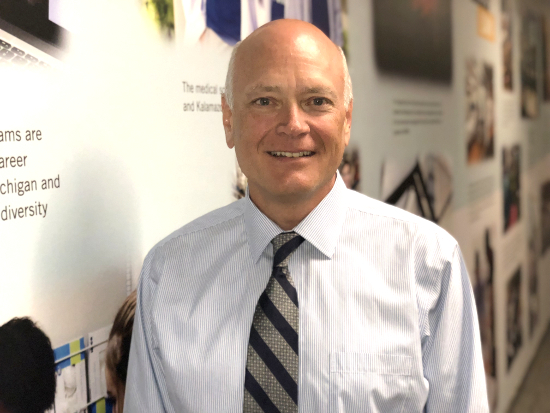
When he began discussions about the creation of a new position at the medical school focused on wellness, Dr. Hal B. Jenson saw an opportunity to address what he says has become a point of national concern – the well-being of the clinicians who are providing medical care.
“The increasing pressures and demands that are put on our clincians are adversely affecting the quality of care,” Dr. Jenson said recently. “And the data demonstrates that the well-being of the individuals providing the care has a direct impact on the quality of care that’s provided.”
With all of that in mind, Dr. Jenson and other WMed leaders, as well as faculty, residents, students and staff, welcomed Karen Horneffer-Ginter, PhD, to the medical school in July in a newly created position as the new assistant dean for Wellness.
“If we are committed to providing better patient care, we have to focus on the health of our clinicians,” Dr. Jenson said. “You can’t help your patients if you’re not in a state of well-being yourself.”
Dr. Horneffer-Ginter’s new role, which is made possible through a partnership between the medical school and the Fetzer Institute, is one aimed at developing and implementing programs at WMed that will improve wellness and provide a healthy environment for all members of the medical school community.
Her responsibilities are multifaceted and include the implementation of methodologies to cultivate compassion and resilience across the institution while also serving as an additional connection to the medical community for the Fetzer Institute, an organization with a mission to help build the spiritual foundation for a loving world.
For her part, Dr. Horneffer-Ginter said she applauds and appreciates the work by WMed leaders and the Fetzer Institute to bring attention and focus to the topic of wellness in a medical school community.
“I’m thrilled and honored to be building on all that has happened here,” she said.
Dr. Jenson said the Fetzer Institute was a closely engaged partner in making Dr. Horneffer-Ginter’s role a reality. He said the Institute’s focus on mind-body-spirit health goes hand-in-hand with the medical school’s mission to train competent and compassionate physicians who seek to treat the whole patient, not just the ailment.
Dr. Jenson said the development and evolution of Dr. Horneffer-Ginter’s position at the medical school is important and he believes that her work has the potential to deeply affect and improve patient care as she works with students, residents, staff, and faculty, including WMed’s large network of community faculty who practice medicine in Kalamazoo and throughout Southwest Michigan.
“That’s the bottom line and the most important reason we are doing this – to improve patient care,” Dr. Jenson said. “The medical school is uniquely positioned to touch medical practices across Kalamazoo and Southwest Michigan.”
Dr. Jenson said the medical school’s commitment to wellness is about more than just helping members of the WMed community with stress management or to implement a stress-free environment. In fact, he said a certain amount of creative stress is beneficial and often serves as an impetus to improve the challenges and problems we will inevitably encounter.
Instead, he said he is hopeful that Dr. Horneffer-Ginter’s work will lead to students, residents, staff, and faculty finding beneficial ways to cope with stress while also being successful and happy with a mix of responsibility and work that is fulfilling and productive.
“The essence of wellness, to me, in the work setting is to achieve bringing joy to one’s life through one’s work,” Dr. Jenson said.
As he looks ahead, Dr. Jenson said he believes that the focus on wellness at WMed and the work by Dr. Horneffer-Ginter will lead to programs, processes, and collaborative activities that other medical schools can emulate. Additionally, he said he is hopeful that, through research and scholarly publications, the medical school can be established as a thought leader in wellness in the medical profession over the next several years.
